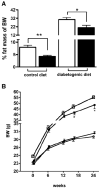Defective lipid delivery modulates glucose tolerance and metabolic response to diet in apolipoprotein E-deficient mice
- PMID: 17914034
- PMCID: PMC2830804
- DOI: 10.2337/db07-0403
Defective lipid delivery modulates glucose tolerance and metabolic response to diet in apolipoprotein E-deficient mice
Abstract
Objective: Apolipoprotein E (ApoE) regulates plasma lipid levels via modulation of lipolysis and serving as ligand for receptor-mediated clearance of triglyceride (TG)-rich lipoproteins. This study tested the impact of modulating lipid delivery to tissues on insulin responsiveness and diet-induced obesity.
Research design and methods: ApoE(+/+) and apoE(-/-) mice were placed on high-fat-high-sucrose diabetogenic diet or control diet for 24 weeks. Plasma TG clearance, glucose tolerance, and tissue uptake of dietary fat and glucose were assessed.
Results: Plasma TG clearance and lipid uptake by adipose tissue were impaired, whereas glucose tolerance was improved in control diet-fed apoE(-/-) mice compared with apoE(+/+) mice after an oral lipid load. Fat mass was reduced in apoE(-/-) mice compared with apoE(+/+) mice under both dietary conditions. The apoE(-/-) mice exhibited lower body weight and insulin levels than apoE(+/+) mice when fed the diabetogenic diet. Glucose tolerance and uptake by muscle and brown adipose tissue (BAT) was also improved in mice lacking apoE when fed the diabetogenic diet. Indirect calorimetry studies detected no difference in energy expenditure and respiratory quotient between apoE(+/+) and apoE(-/-) mice on control diet. Energy expenditure and uncoupling protein-1 expression in BAT were slightly but not significantly increased in apoE(-/-) mice on diabetogenic diet.
Conclusions: These results demonstrated that decreased lipid delivery to insulin-sensitive tissues improves insulin sensitivity and ameliorates diet-induced obesity.
Figures





References
-
- Kahn BB, Rossetti L. Type 2 diabetes: who is conducting the orchestra? Nat Genet. 1998;20:223–225. - PubMed
-
- Taylor SI. Deconstructing type 2 diabetes. Cell. 1999;97:9–12. - PubMed
-
- Unger RH. Minireview. Weapons of lean body mass destruction: the role of ectopic lipids in the metabolic syndrome. Endocrinology. 2003;144:5159–5165. - PubMed
-
- McGarry JD. Banting Lecture 2001: Dysregulation of fatty acid metabolism in the etiology of type 2 diabetes. Diabetes. 2002;51:7–18. - PubMed
-
- Cline GW, Petersen KF, Krssak M, Shen J, Hundal RS, Trajanoski Z, Inzucchi S, Dresner A, Rothman DL, Shulman GI. Impaired glucose transport as a cause of decreased insulin-stimulated muscle glycogen synthesis in type 2 diabetes. N Engl J Med. 1999;341:240–246. - PubMed
Publication types
MeSH terms
Substances
Grants and funding
LinkOut - more resources
Full Text Sources
Molecular Biology Databases
Research Materials
Miscellaneous

